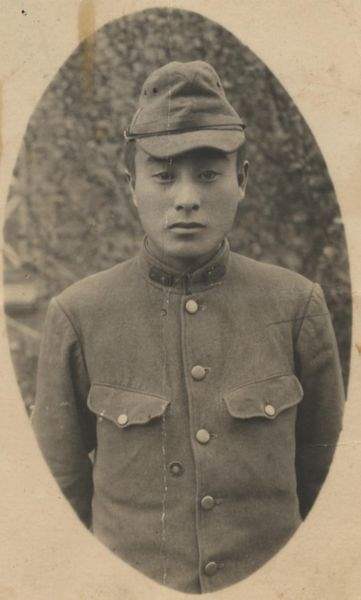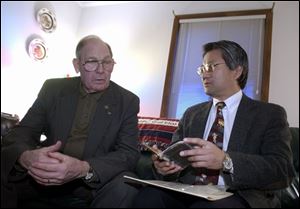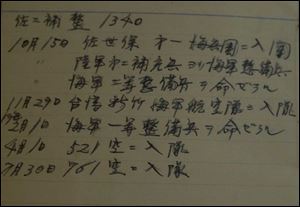
Bluffton man to send diary of Japanese soldier home
3/13/2002
Mitsuyoshi Yoshimoto's journal indicates he was a mechanic and later assisted with medical duty in the Philippines.

Wayne Matter, left, learns about the diary from Joseph Hara, a professor of Japanese at the University of Toledo who translated portions of it.
On New Year's Eve, 1943, a Japanese soldier reflected on his country's chances for victory in World War II.
“I am confident that we will win,” Mitsuyoshi Yoshimoto wrote in his journal. “Our determination may be similar to the enemies' determination to win, but we have a bigger hope for the future of Japan.”
The soldier's thoughts have been preserved in hastily written Japanese characters for almost 60 years, confined to a box of wartime keepsakes in Bluffton, Ohio.
“I never gave it much thought,” said Wayne Matter, an ex-U.S. Marine who found the diary while stationed in the Philippines. “I had no idea what we were sitting on.”

Entries, which were written in phrases rather than complete sentences, date from November, 1943, to July, 1944.
The small journal, untouched for decades, expressed the Japanese soldier's last great hope: that, if found, someone would return the diary to his family.
The final two pages of the book describe Mr. Yoshimoto's life and list names and birth dates for his daughter and two sons.
All three children are alive. Kumi Iwase, a Japanese exchange teacher at Bowsher High School, has made contact with Mr. Yoshimoto's oldest son.
“He is so excited,” she said. “He said he does not have anything of his father's, not even his ashes.”
The youngest son never met his father. Now the journal's author, who remained a mystery for so many years, can become a tangible memory for his children.

Mitsuyoshi Yoshimoto's journal indicates he was a mechanic and later assisted with medical duty in the Philippines.
Mr. Matter is committed to returning the weathered and torn diary with the word “Extra” on the cover - and a yellowed photograph of its writer found next to it - to the Japanese family.
He plans to work with government officials to get the journal safely to Japan, the homeland that Mr. Yoshimoto never saw again after joining the Japanese navy air corps. He perished serving in the Philippines after several months of duty in Taiwan.
Mr. Yoshimoto was a mechanic and later assisted with medical duty, said Dr. Joseph Hara, a professor of Japanese at the University of Toledo who has translated some of the journal.
Entries are dated from November, 1943, to July, 1944. They mostly chronicle daily activities and military information, including the dates of comrades' deaths. Amid the sea of facts and figures float several personal comments that provide insight into the struggling soldier's experience.
Hunger is a recurring theme. In one entry, Mr. Yoshimoto mentions eating only two bananas for dinner. He later wrote in his journal: “We are supposed to be in the Imperial Navy and are supposed to endure all these pains, but we can't fight with empty stomachs.”
Mr. Yoshimoto wrote that he was dedicated to serving the emperor, but he wrestled with self-doubt. Three months into his service, he wrote, “I will do my best to serve my country, but I am still not sure how good I can be.”
Other entries recall a peaceful morning with birds chirping and several occasions when he exchanged letters with family members, including a brother in Manchuria. In May, 1944, Mr. Yoshimoto wrote that he sent a good-luck charm to his sister and recorded the death of three friends.
The journal contains more personal information than Mr. Matter suspected. When he picked it up in 1945 at an abandoned Japanese camp in the Philippines, he assumed the journal was a record book.
“I had no idea,” Mr. Matter said. “I was amazed at the stuff Dr. Hara found in there.”
It was Ryan Matter, a grandson of the ex-Marine, who started unraveling the journal's secrets. Ryan asked his grandfather to lend it to him so he could show it to his class at Maumee High School during their studies of World War II.
Ryan's teacher, Stacy Miller, encourages students in her 11th-grade history class to speak with grandparents about their military experiences. Many students bring her their grandparents' photographs, war medals, or even old weaponry, but the Japanese soldier's journal was a unique artifact.
“I wanted to find out if there was any sort of human aspect in this diary,” Ms. Miller said. “So much of what we teach about the Japanese is that their methods of warfare were gruesome, but the diary could show what the writer was feeling.”
Ms. Miller showed the journal to Japanese teachers at Bowsher High School, who translated part of the text. Kristi Pawlak, one of the teachers, said the writings are difficult to understand because the grammar and vocabulary used in the 1940s is different from contemporary Japanese. Most of the journal is written in phrases, rather than complete sentences.
Although she could not decipher most of the journal, Mrs. Pawlak was intrigued by the journal. She contacted Dr. Hara, hoping he could help with the translation. Dr. Hara worked on interpreting the journal while her co-worker, Ms. Iwase, used connections in Japan to track down the author's eldest son.
Just as the journal has forged a connection between cultures, connections between three generations have grown in the Matter family. Even before learning of the journal, Ryan said he was proud of his grandfather's military service. The aspiring Naval Academy student often wears his grandfather's wool Marine coat to school.
Ryan's father, Ron, superintendent of Northwood schools, wore the jacket during his high school and college days before passing it to Ryan. He said the journal has kindled discussion of the elder Mr. Matter's war experiences.
“It's been interesting to hear Dad tell more stories,” he said.
The 76-year-old veteran said the diary brings back some painful memories of the war. Hearing about the experiences of the Japanese soldier, he recalled the persecution that Filipinos faced under Japanese occupation. But he said he bears no animosity toward Japanese people and is grateful for Dr. Hara's help in translating the diary.
An e-mail containing the scanned photo found with the journal was sent to Mr. Yoshimoto's oldest son for verification. The journal and photo will be forwarded soon.
“I'd be more than happy to see the right people get hold of it,” Mr. Matter said. “I'm happy for the family and I'm going to get it back to them.”